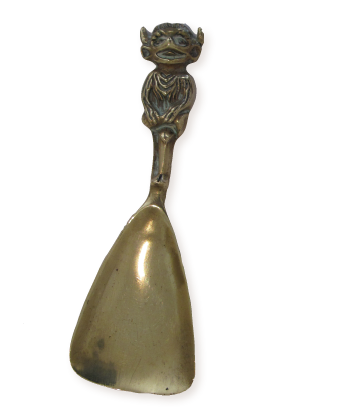BETTER THE DEVIL YOU KNOW ...?

BETTER THE DEVIL YOU KNOW ...?
By Roger C Brookes
’Therfor behoveth him a ful long spoon That shal eat with a feend thus herde I seye’
Geoffrey Chaucer, The Squires Tale, circa 1386
My father used to have a saying, ‘going to sup with the devil with a long-handled spoon.’ He used the quote from time to time and I did no more than take passing notice. I had a job in the city, not a lot of spare time and unsurprisingly my own interests. Furthermore, there was no internet to enable a quick reference; I am now indebted. Also, I am afraid I did not take particular notice of the context in which my father used the ‘quote.’ After my father Sir Wilfred Brookes died in 1997, I started to wonder about the quote and so recently looked it up on the internet. I found a number of Bibliography where great writers had used similar types of expression as well as Chaucer in the Canterbury Tales (see above).
In Shakespeare’s Comedy of Errors, Drossus of Syracuse says ‘Marry, he must have a long spoon that must eat with the devil.’ The words used by these writers do not contain ‘long handled’ but merely refer to a ‘long spoon’. The reader is thus not informed as to whether the handle is long, or the bowl of the spoon is long or both. In my father’s case it is the handle that is mentioned as being long and nothing is said about the bowl that must be assumed to be normal in length.
In some other cases I seem to remember my father saying simply ‘sup with the devil with a long-handled spoon.’ Let us assume that here he was referring to a meal he had attended where he did not approve of the ethics of the host: on the other hand, if he had added the words ‘going to’ then perhaps he had received an unwelcome invitation.
He is not speaking of the devil as some mythical creature but of an unsavoury individual. The difficulty here is that it is over fifteen years since my father died, so I can’t remember too much about this usage.
What caused me to further examine the quotation was that when I had an accident to my leg and was recovering in August 2012, I noticed on my dressing table, a small antique brass spoon that had been in the house all my life. The arrangement of most items on the top is still the same as on my mother’s death in 1968. Until the present, I had not examined the devil spoon in detail and certainly not with the quotation in mind. The handle was rather short and was in the form of a small devil while the unusual bowl was long and triangular in shape. I suddenly saw the spoon in an entirely different light. However, the spoon’s design would not have kept the user away from the devil. The question arises as to where the spoon originally came from? It seems to me probably from my mother’s side, as my father kept nothing belonging to his parents. Her father may have referred to this spoon in the context of ‘sup with the devil’: it is very much the sort of thing my grandfather would have said. In this case my father may have incorrectly remembered comments about the spoon by his father-in-law, A H Heal.
The interesting thing is that one’s parents can misquote the sayings of their own parents, who may themselves be incorrect; also, they may quote without knowing the source.
Perhaps like me, they erred in not cross-examining their parents fully when they heard a probable quotation. All in all, the quotation used by my father seems to be the most appropriate. It is the long handle that would keep him away from the devil, a live person he had to meet for commercial reasons. The question is where to dine and whether it be business attire or smart casual? In Shakespeare’s The Tempest, Stefano says: ‘Mercy! Mercy! This is a devil I will leave him I have no long spoon.’
This article was first published in fairhall, Issue 8, March 2013, pp 19.
Journals
About US
Explore
Contact
VISIT
See our VISIT page for hours and directions
BY PHONE
+61 3 9416 2515
BY POST
PO Box 79, East Melbourne VIC 8002
ONLINE
General enquiries
Membership enquiries
Shop
Donation enquiries
Subscribe to E-Newsletter



